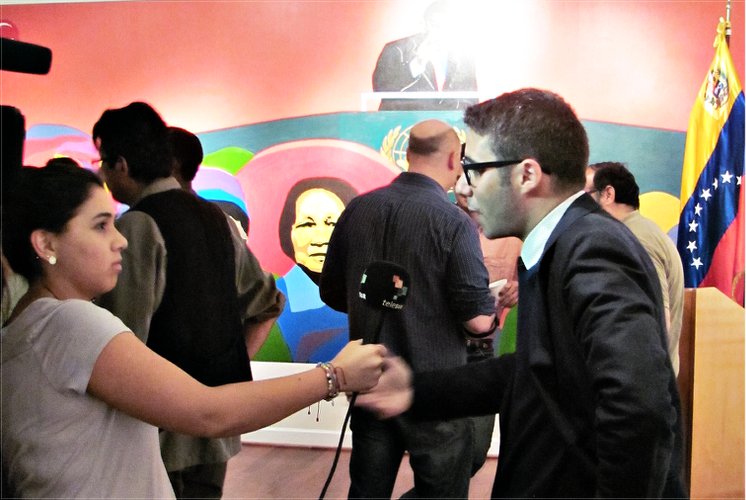

Venezuelan Ambassador-designate Maximilien Sánchez Arvelaiz being interviewed.
The Embassy of Bolivarian Venezuela inaugurated the Hugo Chávez Library in Washington on July 31, the week marking what would have been the late president’s sixty-first birthday. The new library reflects the contributions of Chávez’s visionary leadership in advancing continental integration and development, and empowering the most oppressed and marginalized sectors of Venezuelan society.
The program featured Oliver Stone’s film “My Friend Hugo,” with glimpses of Chávez’s energy, warmth and reciprocal love with the red clad masses — men, women and children. Remarks by Ambassador Designate Maximilien Sánchez Arvelaiz explained how the library’s photo displays of Chávez with many authors highlight his love of reading and books.
A spectacular mural, spanning a whole wall and painted collectively, depicts Chávez at the United Nations with an internationalist representation of people from around the world. An Iranian woman in the audience commented on the longstanding friendship between Iran and Bolivarian Venezuela.
The new Chávez Library refutes U.S. imperialism’s demonization and justification for sanctions against Bolivarian Venezuela. A brochure on social programs published by the Embassy of the Bolivarian Republic of Venezuela in the U.S. describes the new reality. It states: “In the past, Venezuela’s oil wealth benefited a few. Today, it benefits a few million.” These benefits include social programs for health, education, nutrition and human rights, covering Indigenous people, people of African descent and workers in general. Also guaranteed are gender equality and the right of every person to vote.
Although the library is a work in progress and currently open only by appointment, it is already an important source for information about Chávez and the Bolivarian process that continues today.
WW photos: Cheryl LaBash
The epic struggle of the Palestinian people against the full weight of U.S. imperialism and…
The following report comes from the Bronx Anti-War Coalition organizers on a protest held in…
In the Canadian federal elections held on April 28, the Liberals won with 169 seats…
The following is Part 2 of a talk given by the author to a meeting…
Boston Students, professors and workers are confronting the Trump administration’s fascist crackdown at universities across…
Philadelphia Within days of Swarthmore students reviving a pro-Palestinian encampment on April 30, police arrested…